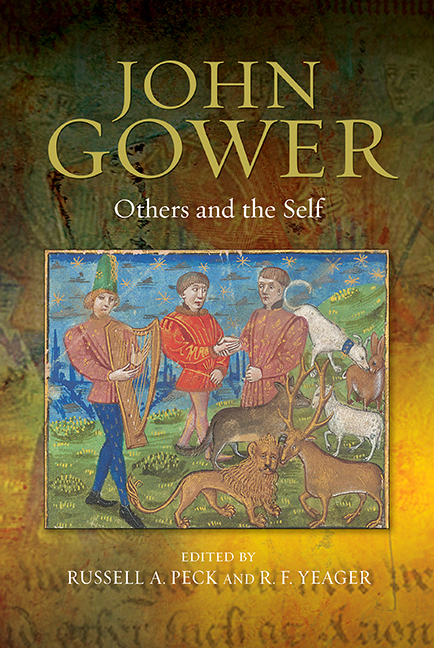Book contents
- Frontmatter
- Contents
- List of Illustrations
- Abbreviations
- Introduction
- PART I KNOWING THE SELF AND OTHERS
- PART II THE ESSENCE OF STRANGERS
- PART III SOCIAL ETHICS, ETHICAL POETICS
- 11 Gower's Governmentality: Revisiting John Gower as a Constitutional Thinker and Regiminal Writer
- 12 Gower's Speculum Iudicis: Judicial Corruption in Book VI of the Vox Clamantis
- 13 “The Lucre of Marchandie”: Poet, Patron, and Payment in Gower's Confessio Amantis
- 14 Hidden Matter in John Gower's Confessio Amantis
- 15 Writing the Cinkante Balades
- 16 Gower in Early Modern Spanish Libraries: The Missing Link
- Bibliography
- Index
- VOLUMES ALREADY PUBLISHED
11 - Gower's Governmentality: Revisiting John Gower as a Constitutional Thinker and Regiminal Writer
from PART III - SOCIAL ETHICS, ETHICAL POETICS
Published online by Cambridge University Press: 30 April 2019
- Frontmatter
- Contents
- List of Illustrations
- Abbreviations
- Introduction
- PART I KNOWING THE SELF AND OTHERS
- PART II THE ESSENCE OF STRANGERS
- PART III SOCIAL ETHICS, ETHICAL POETICS
- 11 Gower's Governmentality: Revisiting John Gower as a Constitutional Thinker and Regiminal Writer
- 12 Gower's Speculum Iudicis: Judicial Corruption in Book VI of the Vox Clamantis
- 13 “The Lucre of Marchandie”: Poet, Patron, and Payment in Gower's Confessio Amantis
- 14 Hidden Matter in John Gower's Confessio Amantis
- 15 Writing the Cinkante Balades
- 16 Gower in Early Modern Spanish Libraries: The Missing Link
- Bibliography
- Index
- VOLUMES ALREADY PUBLISHED
Summary
Introduction: Gower, Constitution, Governmentality
Certainly one of the most durable and vexing topics of Gower studies is his relation to contemporary politics and law, a subject that has spawned a large body of scholarship now in its seventh decade, if we take George Coffman's foundational work in 1945 as its beginning. Scholarly interest and activity have accelerated in the last ten to twenty years as we have learned more about Gower's legal and political environment from the 1360s to the turn of the fifteenth century. Most recently Candace Barrington, David Carlson, Conrad van Dijk, and others have investigated the poet's central focus and anxieties concerning not just kingship but also a wide range of issues attendant to the law, political power, and poetic practice in the turbulent period surrounding the Lancastrian usurpation. This is a natural and in some ways inevitable temporal focus, as Gower was the one major public poet to comment directly on current events. The intensity of those political engagements has also prompted investigation into the generic innovations he deployed to make them. But the desire to parse out a partisan timeline or clear affiliation—that is, what side Gower was on, Ricardian or Henrician, and when—has also tended, at times, to emphasize more distant and abstract sources of legal context, such as the procedures of English common law or the doctrines of civil law. What results is a curiously bifurcated Gower, simultaneously immediate yet abstract, with a potentially awkward fit between our reading of his politics and the known textual and intellectual environment of his work. This bifurcation makes it difficult for us to see Gower in a new perspective, one that might shed a different light on his genre-experiments and political commitments.
The particular examples of this dynamic that I would like to consider here are two sources of his political writings that are both traditionalist and innovative: his adaptations of the De regimine and Secretum secretorum. Gower was the first composer of an English Furstenspiegel (leaving aside Trevisa's translation of Aegidius’ De regimine) and, at the same time, a firstrate storyteller. Given the florescence of De regimine writings and the many English adaptations of the Secretum secretorum that followed in the fifteenth century, Gower clearly stood at the start of an important trend.
- Type
- Chapter
- Information
- John Gower: Others and the Self , pp. 225 - 259Publisher: Boydell & BrewerPrint publication year: 2017

